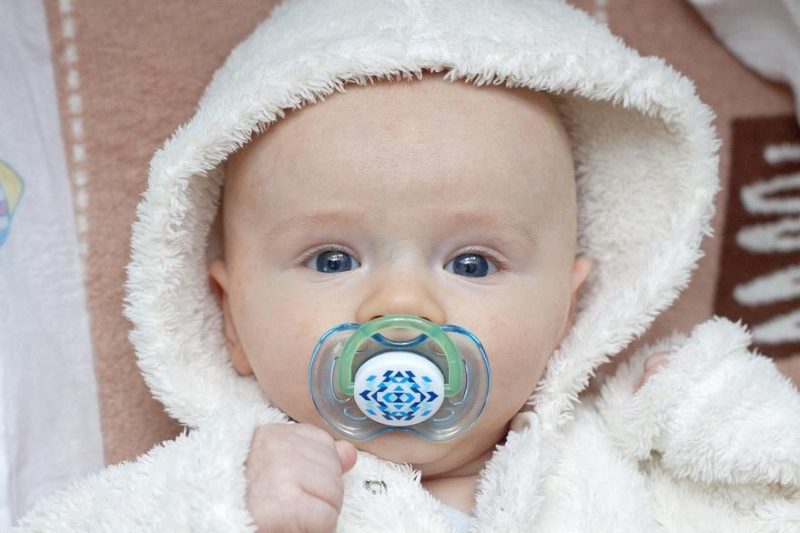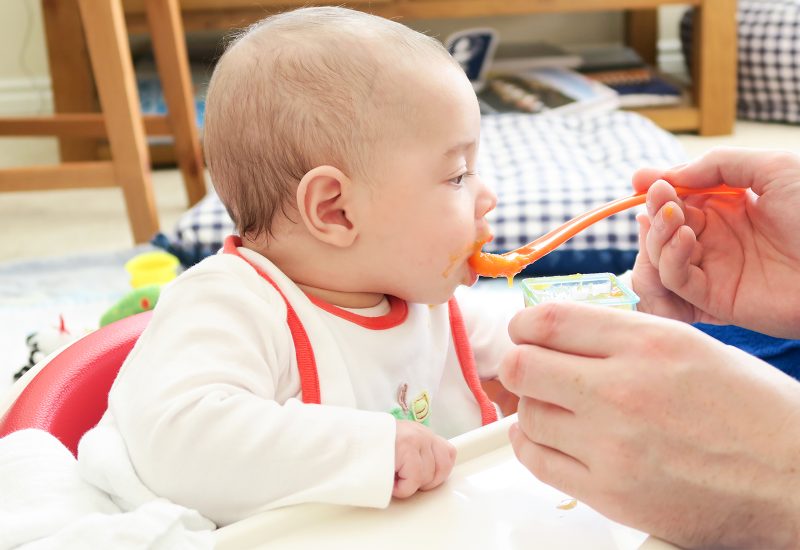The first time that you see your little one chewing on their tongue, it can be puzzling. Your baby will be sitting there, and then all of a sudden it seems like they are chewing on a piece of gum. You check their mouth, and there is nothing there. This is often the scenario when your baby first chews on their tongue. It was when my son did it.
At first, I was a bit concerned. I had no idea that a baby would chew on their tongue. My firstborn never did that, so this was a new concept to me. I immediately called his pediatrician and started looking things up as I was both puzzled and slightly curious. I discovered that it is normal for babies to chew on their tongue, and can signal a few things about development, too.
Reasons For Baby Chewing Tongue
There are several reasons that a baby might chew on their tongue, and most of them are completely normal. This can be a routine part of development.
Baby Feels Hungry
As babies get older, they associate chewing with eating. Instead of crying to be fed, they might start to chew on their tongue because it is already in their mouth. It makes sense that when babies are hungry they will make this motion. You can tell if your baby is chewing on their tongue because they are hungry by paying attention to when they do it. If it is close to mealtime or they stop once they are fed, this is a cue that they are hungry.
Sucking Reflex
Sometimes, newborn babies will make this move as a part of their sucking reflex. Parents often use pacifiers if babies want something to suck on, and older babies will suck on their hands. Newborn babies might not cry for a pacifier or be able to coordinate their hand into their mouths, leaving them with limited options. If there is nothing else in their mouth, they make the same chewing motion and the end result is them chewing or sucking on their tongue.
View in gallery
They Found Their Tongue
As babies get older, they start to learn that they have many different parts to their bodies that they can move and play with. Babies will discover that they have feet, how to move their fingers and they will learn that they have a tongue. As babies play with their tongue, they will more than likely chew on it at least once or twice. To determine if this is the reason behind your baby chewing tongue situation, pay attention to what else your little one is doing. If they are constantly moving their tongue, sticking their tongue out, or sticking their hand in their mouth to learn what is in their mouth they are more than likely chewing on their tongue as a form of discovery.
Necessary Developmental Milestone
If babies are about four months old, it is common for them to be chewing on their tongue. The tongue plays an important role in eating solid food, so babies need to know how to use their tongue properly in order to eat. Babies that are almost ready for solid food will chew on their tongue as they learn how to properly move. This is not something that one should be concerned about. If a baby tongue chewing is due to them getting ready for solid foods, it will pass on its own.
What To Do About Baby Tongue Chewing
Even though it is normal for babies to chew on their tongue, it can still bother or concern parents. Most parents will be concerned about babies accidentally biting themselves, and some parents will want to make sure that their baby’s needs are being met instead of allowing a baby to self-soothe by tongue chewing. These are some easy solutions that can help your baby to stop chewing on their tongue.
Provide Teething Toys
If babies are teething, they will chew on almost anything. A parent that has noticed teeth coming in or that their baby has swollen gums can provide teething toys, encouraging babies to chew on something that is not their tongue.
Satisfy the Sucking Reflex
If your baby is closer to a newborn baby in age, and you believe that this is a part of the sucking reflex, try giving them a pacifier to suck on. This can help satisfy the urge to suck on something and lessen the time that newborn babies spend chewing or sucking on their tongue.
Feeding Schedule
If babies are chewing on their tongue because they are hungry, try implementing a feeding schedule. Then, you will feed them before hunger cues, such as baby tongue chewing, start. This alone might be enough to get them to stop the behavior.
Start Solid Food
If baby tongue chewing is a developmental phase, it means that they are almost ready to start solid food, or they are ready to start solid food. If your baby is already old enough to eat baby food, it’s time for that important milestone! Pick up some baby food the next time you are at the store. Don’t forget to follow important guidelines when feeding your baby new foods. Start with one food at a time to determine if there are any allergies, and only feed them a little bit of baby food at a time to make sure that they don’t choke. While feeding baby food, babies still need to drink formula for vitamins and nutrients. Ask your pediatrician for guidelines pertaining to feeding your little one baby food or check out some tips for feeding your lo baby food.
.View in gallery
Don’t Try to Prevent Baby Chewing Tongue
If baby tongue chewing is a part of normal development, simply leave it alone. Babies need to explore how their mouth works to eat properly. Once they have mastered how to move their tongue properly, the behavior will more than likely quit on its own.
To determine what will get your baby to stop tongue chewing, it’s important to figure out why they are chewing on their tongue. Look for other clues as indicators as to the reason, such as swollen gums for a teething baby. This will tell you what actions you can take to stop baby tongue chewing. It’s also important to know when it’s time to worry.
Baby Chewing Tongue: When to Worry
Most people are worried as soon as they see their baby chewing on their tongue, but you don’t need to worry just yet. Tongue chewing is normal as babies learn that they have a tongue, and how to move their mouths to chew. If you are concerned, it never hurts to double-check with their pediatrician to ease your anxiety.
When you do notice your baby tongue chewing, make sure that you check their mouth. Babies can start to develop fine motor skills almost overnight, and you want to make sure they did not get something in their mouth that should not be there. The most frustrating part of a baby chewing on their tongue will be checking their mouth so frequently to make sure they are only chewing on their tongue.
As babies get older, most will quit doing this. If they are still chewing on their tongue when they grow teeth, they might accidentally bite themselves. If this hurts, they will quit on their own. Some babies quit on their own without ever hurting themselves. They simply outgrow it.
Other times, this behavior can signal other behavioral issues or disorders, such as anxiety. If your baby does not stop chewing on his or her tongue as they get older, it’s important to consult your pediatrician or specialist.
Continued Tongue Chewing Despite Pain
Most babies will accidentally bite themselves a time or two if they keep chewing on their tongue. This usually deters babies from tongue chewing. However, if baby tongue chewing is a sign of another underlying problem they may continue to chew on their tongue despite it hurting. If your baby is accidentally biting themselves and continues to chew on their tongue, consult a doctor to make sure that there is not another underlying issue.
Continues for Extended Period of Time
If your little one continues to chew on their tongue despite taking measures to prevent it and there does not seem to be anything else going on, give it some time. If it continues, consult your pediatrician. This could affect their oral development later down the road. While it may not be anything to worry about, it’s always better to be safe instead of sorry.
Babies do all kinds of things that we don’t understand until we have a little one. Baby tongue chewing is one of those things. This could be a sign of teething, a need to satisfy their sucking reflex or older babies might have finally discovered that they have a tongue. Follow these guidelines to understand why your bundle of joy is chewing on their tongue, and what to do to encourage other behaviors. If you’re still worried, there is nothing wrong with calling the doctor, either. If the doctor is concerned, they can refer you to a specialist to make sure that your baby is okay.






